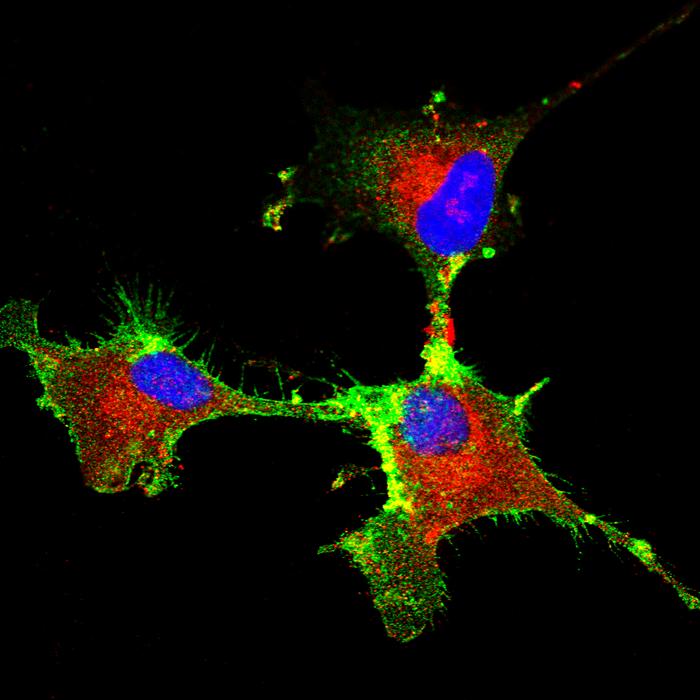
Glioblastoma, or GBM, is recognized as one of the most formidable challenges in modern oncology. This highly aggressive form of brain cancer poses significant treatment hurdles, severely impacting patient survival. Glioblastoma accounts for approximately half of all brain tumor diagnoses and the prognosis remains dismal, with patients averaging a mere 12 months post-diagnosis. The quest for innovative treatments has intensified as researchers work tirelessly to improve outcomes for the thousands affected each year.
Current therapeutic strategies predominantly include surgical resection of the tumor, followed by a regimen of chemotherapy and radiotherapy. Temozolomide (TMZ) is the standard chemotherapeutic agent utilized in these scenarios, aimed at mitigating tumor progression. Nevertheless, the efficacy of TMZ is observed to be limited, as tumor cells frequently manifest a resurgence within months of treatment, often in a markedly more aggressive form, which underscores the urgent need for new targets and strategies in glioblastoma therapy.
The focus of recent research has been placed on understanding the underlying biological mechanisms of glioblastoma. An exciting new study led by Professor Marilene Hohmuth Lopes from the University of São Paulo has unveiled the prion protein as a pivotal player in glioblastoma biology. This research holds significant promise, specifically regarding how prion proteins influence glioblastoma stem cells, which are notoriously resilient and capable of driving tumor recurrence after conventional treatment modalities fail.
Professor Lopes’ group investigated the cellular landscape post-treatment to identify residual tumor cells within the surviving brain tissue. They discovered the presence of a subpopulation of tumor cells known as glioblastoma stem cells, which remained dormant yet capable of reinitiating tumor growth when reactivated. The resilience and self-replenishing nature of these stem cells are of particular concern, as they complicate eradication efforts and contribute to the aggressive recurrence of the disease.
This new research found a remarkable correlation between elevated levels of prion proteins and the presence of aggressive glioblastoma tumors. Prion proteins, integral to various vital biological functions within the central nervous system, have a substantial impact on neuronal interactions, memory processes, and overall brain plasticity. However, their role within the context of cancer has been largely unexplored until now, making this discovery particularly groundbreaking.
The research utilized patient samples to analyze prion protein expression levels, revealing its association with tumor aggressiveness. The prion protein’s ability to be readily targeted by pharmacological interventions marks it as a potential therapeutic candidate in combating glioblastoma. Given its surface-level expression, therapeutic strategies targeting prion proteins could feasibly navigate the complexities of the blood-brain barrier, thereby enhancing drug delivery to affected areas of the brain.
In a series of in vitro experiments, the research team noted a significant upregulation of prion proteins during glioblastoma stem cell culture, suggesting an essential regulatory role in maintaining the characteristics of these stem cells. This observation was pivotal in the decision to utilize CRISPR-Cas9 technology to genetically edit glioblastoma stem cells, effectively inhibiting prion protein production. The resultant modifications in cellular behavior indicated a marked reduction in both invasiveness and proliferative capacity.
While the results indicate that targeting prion proteins could emerge as a viable novel therapeutic strategy, the complexity of glioblastoma biology suggests that effective treatment will likely require a multifaceted approach. Initial findings demonstrate that prion proteins may interact with various signaling pathways, necessitating further investigation into their role in glioblastoma pathogenicity.
Professor Lopes and her team also delved into the interactions between prion proteins and CD44, another significant marker associated with cancer stem cells. Their research aims to elucidate the intricate interplay between these two proteins and how they contribute to tumor maintenance and progression. Initial insights indicate that prion proteins may serve as scaffolding molecules, facilitating essential signaling networks at the cellular membrane level, crucial for tumor cell survival and proliferation.
The trajectory of this research could pave the way for transformative advances in glioblastoma treatment, although it is crucial to acknowledge that translational applications may require years of rigorous investigation. Basic research serves as the foundation for clinical applications, and understanding the molecular mechanisms that underpin glioblastoma stem cell dynamics is vital for developing effective interventions.
The commitment to unraveling the complexities of glioblastoma biology continues to drive this research forward. As the scientific community strives to translate these foundational discoveries into treatment paradigms, there remains an unwavering hope for enhanced recovery and survival rates for glioblastoma patients.
In summary, the exploration into the role of prion proteins in glioblastoma represents a significant step toward shedding light on the intricate biology of this pernicious disease. The findings could eventually inform more targeted therapeutic strategies aimed at overcoming the limitations imposed by current treatment protocols.
Through sustained research efforts and advancements in understanding glioblastoma biology, clinicians and scientists are working diligently to bring forth effective treatments that could prolong and improve the quality of life for those afflicted by this challenging disease.
Subject of Research: The role of prion protein in glioblastoma stem cells
Article Title: Prion protein regulates invasiveness in glioblastoma stem cells
News Publication Date: 18-Dec-2024
Web References: http://dx.doi.org/10.1186/s12885-024-13285-4
References: [Pending publication]
Image Credits: Marilene Hohmuth Lopes and Mariana Prado/ICB-USP
Keywords: Glioblastoma, prion protein, glioblastoma stem cells, cancer therapy, stem cell research, molecular oncology, CD44, CRISPR-Cas9, drug development, blood-brain barrier.
Tags: aggressive brain cancer characteristicsbiological mechanisms of glioblastomabreakthroughs in oncology researchchemotherapy and radiotherapy for glioblastomaglioblastoma patient survival ratesglioblastoma treatment challengesinnovative therapies for glioblastomanew targets for glioblastoma therapyprion protein role in brain cancersurgical resection in brain tumorstemozolomide efficacy limitationsUniversity of São Paulo glioblastoma study





